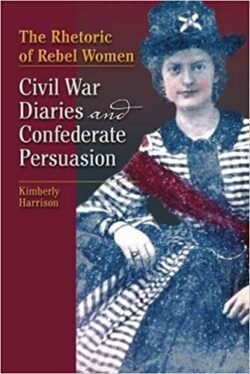Harrison, Kimberly. “The Rhetoric of Rebel Women: Civil War Diaries and Confederate Persuasion,” Southern Illinois University Press, 2013, ProQuest eBook Central, https://ebookcentral-proquest-com.ezproxy.snhu.edu/lib/snhu-ebooks/detail.action?docID=1402889.
Kimberly Harrison examines hundreds of women from the Southern Confederacy and the use of their diaries, journals, letters, and prayers in order to create a rhetorical response to the War, or a strategically silent response. Elite Confederate rebel women, through journals, letters, diaries, and other means of outright societal or Unionist protest, prepared to face the invading enemy, deal with their presence, and later their aftermath. In, The Rhetoric of Rebel Women: Civil War Diaries and Confederate Persuasion, Harrison critically analyze the issues that befell the women of the South, particularly the social elite of the Confederate society. Taking unusual steps to uncover their documents, so their voices can be heard, Harrison painstaking researched new and old sources in order to shed light on the importance of these women to the Civil War, Southern culture, and their healing during Reconstruction.[1]Harrison gives voice to women that historians had not been aware of formerly. It gives us a window into the reasons how these women felt about the tool and use of rhetoric, while remaining proper and the image of “true womanhood” in Victorian society.[2] Harrison feels that women use the rhetoric in many forms to protest the invading forces, handle their presence on their land, and then later to attempt to recreate the Old Southern culture in a New South. Harrison notes the skillful use of well-placed silences to punctuate their important relationship to that of rhetorical responses and protests was another common form of rhetoric as well.
The perception of the American people cannot be understood unless, through their own words, scholars lack information regarding vast segments of Southern elite and middle-class females, they are forgotten by time and memory, but Harrison has studied 100 Civil War diaries and analyzed them for their place in history.[3] Historians, such as Forbes, Grant, and Faust, look at the uniquely feminine southern responses from various segments of the society and classes. Many of these women were never a part of the historical record previously; it is through this type of scholarship that we are introduced to them. We understand so little about how those thoughts and staunch feelings of wartime rhetoric changed lives, historians are now trying to give a fuller picture of the War using women’s voices. Harrison is prepared to answer the hard research questions that permeated her work, what drove women to rhetorical weapons? How did they negotiate their life in the Confederate South and how did they reconcile that with ideas of what is ladylike, prim, and proper? What was the value system that they placed on these ways of employing rhetoric?
Both Faust and Harrison feel that valuable insights into the Confederate mindset exist and we can figure out a deeper level of knowledge by examining these women closer. Many fell in love with Mary Chestnut and her accounts of the war in Ken Burns: The Civil War. This is an extension of that work that moves beyond one wealthy elite woman’s voice, to hundreds — taking Mary’s voice to the next level by adding a chorus of her peers and examining the vast domestic, social, political, and economic facets of their lives. In, Mothers of Invention: Women of the Slaveholding South in the American Civil War, Drew Gilpin Faust, also a leading Civil War women’s historian, examines the lives of white women of the Confederate South. Drew argues that the impacts that the war had on these middle class and elite women of the South, and in turn, they had on the war directly influenced their forms of rhetoric. Harrisons work is in agreement with that as it corresponds to her research. The women of the South, with an invading and occupying force to contend with, saw the war in ways that other women did not, because they were not exposed. The war was in their backyard, plantations, streets, and daily lives. Faust, and Harrison both argue that their hardships were vast and permeated everyday life, outright rebellion left them to fend for themselves and create rhetoric for their outlets.[4] Harrison says the women of the Confederate aristocracy and their impact on the war effort is clouded by their stereotype of what she called the Scarlett O’Hara Southern Belle’s.[5] Blight warns us that not understanding the women’s experience means we do not understand the years leading up to the war for everyone, without rectifying it that meant we did not fully understand either the war or reconstruction.[6] As we uncover more and more of these amazing diaries, we can put one more piece into the puzzle of the American Confederate South. Scholars of the past have dismissed Southern white rebel rhetoricians as thoughtless, inconsequential, self-serving, dismissing it as an emotional catharsis.[7] In the work that Harrison has put together, the picture is vastly different, and very well argued.
Harrison has three main categories for rhetorical responses, the first one discussed in her introduction sets the tone for her arguments on her studies, she argues that women used rhetoric to cope with the coming Union Army, their handling of the occupying forces, and dealing with the aftermath that was reconstruction.[8] Countless diary entries bear up her arguments that women’s responses to the war and troops, the hardships of war, and the economic role changes it imparted, impacted the way women used rhetoric. A fascinating area of the book deals with the women themselves, and how they saw their rhetorical behavior and reconciling that with their “true womanhood” and ladylike decorum when it came to the question of using rhetoric as a woman. Rhetoric was an area that was often attacked by men and women alike of the North as it was not seen as a womanly thing to do, and made them appear, “more inclined to insolence, peevishness, and insulting manner.”[9] She demonstrates how rhetoric changed and became a weapon of politics and a call to remember the wartime sacrifices of the mothers of the revolution, many looking to women of the North and South to outdo one another in patriotism, nationalism, and sacrifice for their country, all through the use of rhetoric.[10] Harrison comes full circle with her look at the “culture of defeat,” and the place of rhetoric to help women cope with the changes to their culture, the rhetoric of conciliation that was created, and in dealing with their men returned home compromised in ways that would never heal.[11]
By bringing more of these older collections that have not been cataloged out into the light of day we are finally making a difference in the landscape of the American Civil War documentation and theory. My work will examine the Civil War experiences of the women of that time. Our views on the causation of the war have changed due to more and more source materials coming to the surface of scholarship. We are critically analyzing person, government, military, and relief organizations for more cogent materials on the war to fill in our past. The women of the era were left out of the scholarship of past decades as they were once felt to be, “inconsequential;” these women show us the use of rhetoric at home as a way of changing their environment, influencing it and thereby exhibiting control over it to a degree, during a time when they had very little control.[12]My scholarship will add to that body of work by displaying the ways that women chose to use new tools and roles available to them. Harrison’s book is a cogent, in-depth explanation of the ways that rhetoric became part of the Confederate females’ tools of political action in order to contribute to the war effort.[13] I will employ this work to add depth to my historiography on the experiences of women in the Civil War through the fascinating look at the lives these women lived. Harrisons work will enrich my section regarding white women of the south’s roles changing in the home and public, though these works are considered to be rhetoric in the home, they were an intrinsic part of the wartime experience for these women seeking to control their world.
As noted, Ken Burns helped us to discover the written works of Mary Chestnut, to follow her perception of life during the war and her special brand of wartime rhetoric from the life of a woman who moved in the upper echelon of Confederate “aristocracy.”[14] The documentary on Mary, as well as her diaries, was our first introduction into the history of rhetoric, and we can thank later historians who are studying Southern life, women’s history, and Civil War Confederate rhetoric. People like Harrison, Faust, and Forbes have put women of the South into our historical record overall. As Harrison herself notes, we have a disturbing lack of information regarding the women of this region, era, and their rhetoric, in order to fill in those histories to gain an inclusive insight to our past that has routinely obscured our view of these women’s lives.[15] She has truly done this and more, it is a fascinating look into the lives of these women who are long dead, yet their words and their thoughts, their very passions are left for historians to organize and enrich the historical record. The book is a highly readable narrative. I enjoyed it thoroughly and would recommend anyone interested in Civil War women’s experiences to pick this book up.
- [1] Kimberly Harrison, The Rhetoric of Rebel Women: Civil War Diaries and Confederate Persuasion, Southern Illinois University Press, 2013, ProQuest eBook Central, https://ebookcentral-proquest-com.ezproxy.snhu.edu/lib/snhu-ebooks/detail.action?docID=1402889.
- [2] Ibid. 22.
- [3] Ibid. 27.
- [4] Drew Gilpin Faust, “Mothers of Invention.” Chapel Hill: University of North Carolina Press, 1996.
- [5] Kimberly Harrison, The Rhetoric of Rebel Women: Civil War Diaries and Confederate Persuasion, Southern Illinois University Press, 2013, ProQuest eBook Central, https://ebookcentral-proquest-com.ezproxy.snhu.edu/lib/snhu-ebooks/detail.action?docID=1402889.
- [5] Ken Burns, “Civil War Documentary.” Public Broadcasting Systems; PBS, 1990, via: https://www.netflix.com/browse?jbv=70202577&jbp=0&jbr=3.
- [6] David. Blight, PhD., “Dr. David Blight, The Civil War and Reconstruction Yale Lecture Series.” Yale Courses at Yale University. YouTube. Accessed April 12, 2019. https://www.youtube.com/user/YaleCourses/search?query=Blight.
- [7] Kimberly Harrison, The Rhetoric of Rebel Women: Civil War Diaries and Confederate Persuasion, Southern Illinois University Press, 2013, ProQuest eBook Central, https://ebookcentral-proquest-com.ezproxy.snhu.edu/lib/snhu-ebooks/detail.action?docID=1402889. 55.
- [8] Ibid. 55.
- [9] Ibid. 55.
- [10] Kimberly Harrison, The Rhetoric of Rebel Women: Civil War Diaries and Confederate Persuasion, Southern Illinois University Press, 2013, ProQuest eBook Central, https://ebookcentral-proquest-com.ezproxy.snhu.edu/lib/snhu-ebooks/detail.action?docID=1402889. 83
- [11] Ibid. 143.
- [12] Ibid. 170.
- [13] Ibid. 171.
- [14] Ken Burns, “Civil War Documentary.” Public Broadcasting Systems; PBS, 1990, via: https://www.netflix.com/browse?jbv=70202577&jbp=0&jbr=3. Episode 1.
- [15] Kimberly Harrison, The Rhetoric of Rebel Women: Civil War Diaries and Confederate Persuasion, Southern Illinois University Press, 2013, ProQuest eBook Central, https://ebookcentral-proquest-com.ezproxy.snhu.edu/lib/snhu-ebooks/detail.action?docID=1402889. 170.
Bibliography
Blight, PhD., David. “Dr. David Blight, The Civil War, and Reconstruction Yale Lecture Series: Homefronts and Battlefronts: “Hard War” and the Social Impact of the Civil War.” Yale Courses at Yale University. YouTube. Accessed April 12, 2019. https://www.youtube.com/user/YaleCourses/search?query=Blight.
Faust, Drew Gilpin. 2010. Mothers of Invention: Women of the Slaveholding South in the American Civil War. Chapel Hill: University of North Carolina Press.
Fields, Barbara J., and Burns, Ken, “Civil War Documentary.” Public Broadcasting Systems; PBS 1990, via https://www.netflix.com/browse?jbv=70202577&jbp=0&jbr=3.
Harrison, Kimberly. The Rhetoric of Rebel Women: Civil War Diaries and Confederate Persuasion, Southern Illinois University Press, 2013, ProQuest Ebook Central, https://ebookcentral-proquest-com.ezproxy.snhu.edu/lib/snhu-ebooks/detail.action?docID=1402889.

